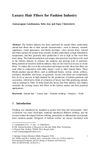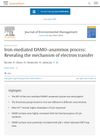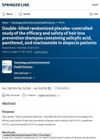
Some vaccines, like the hepatitis B vaccine, might be linked to the hair loss condition Alopecia Areata, but more research is needed.
 6 citations,
September 2014 in “Australasian Journal of Dermatology”
6 citations,
September 2014 in “Australasian Journal of Dermatology” Asylum seekers arriving by boat may face skin problems due to harsh conditions, and doctors should use a thorough skin assessment approach to diagnose and treat them effectively.
 23 citations,
April 2021 in “Journal of Clinical Medicine”
23 citations,
April 2021 in “Journal of Clinical Medicine” Frontal Fibrosing Alopecia's cause is unclear, affects mainly postmenopausal women, and current treatments focus on stopping hair loss rather than regrowth.
 1 citations,
February 2024 in “Environmental health perspectives”
1 citations,
February 2024 in “Environmental health perspectives” Exposure to certain metals may worsen attention-related behaviors in adolescents, with stronger effects in females.
 25 citations,
July 2013 in “Environmental Toxicology and Chemistry”
25 citations,
July 2013 in “Environmental Toxicology and Chemistry” Spironolactone harms fish reproduction and is more potent in fish than invertebrates, needing environmental monitoring.
 11 citations,
January 2008 in “International journal of environment and health”
11 citations,
January 2008 in “International journal of environment and health” Children are at risk of health issues from exposure to platinum group elements from car exhausts.
 7 citations,
January 2012 in “International Journal of Trichology”
7 citations,
January 2012 in “International Journal of Trichology” Two siblings both had a rare case of alopecia areata at the same time.
 7 citations,
January 2013 in “Journal of Investigative Dermatology”
7 citations,
January 2013 in “Journal of Investigative Dermatology” Vitamin A may influence hair loss conditions like alopecia, but more research is needed to understand how.
 14 citations,
April 2014 in “International Journal of Cosmetic Science”
14 citations,
April 2014 in “International Journal of Cosmetic Science” Acne is caused by multiple factors including oil production, bacteria, inflammation, and possibly diet and environment.
 4 citations,
August 2021 in “GSC biological and pharmaceutical sciences”
4 citations,
August 2021 in “GSC biological and pharmaceutical sciences” Some plants might help prevent or treat hair loss.
 March 2012 in “Hair transplant forum international”
March 2012 in “Hair transplant forum international” Environmental factors and chemicals might affect hormone balance and contribute to common hair loss.
 April 2023 in “Journal of Investigative Dermatology”
April 2023 in “Journal of Investigative Dermatology” Being allergic to linalool, a common fragrance ingredient, might contribute to developing frontal fibrosing alopecia.
 23 citations,
December 2020 in “Frontiers in Cell and Developmental Biology”
23 citations,
December 2020 in “Frontiers in Cell and Developmental Biology” Gene network oscillations inside hair stem cells are key for hair growth regulation and could help treat hair loss.
 11 citations,
February 2011 in “Current Zoology”
11 citations,
February 2011 in “Current Zoology” About 20% of Japanese macaques had head alopecia, and stress and environment might cause hair loss.
 6 citations,
January 2016 in “Environmental footprints and eco-design of products and processes”
6 citations,
January 2016 in “Environmental footprints and eco-design of products and processes” The industry should promote pure luxury hair fibers, improve technology, and diversify products to support growers and ensure sustainable use.

Human hair follicle cells can be turned into stem cells that may help clone hair for treating hair loss or burns.
1 citations,
January 2015 in “Elsevier eBooks” Certain pesticides and fungicides can interfere with male hormone functions, potentially causing reproductive issues in male rats.
 8 citations,
February 1997 in “International journal of environmental analytical chemistry”
8 citations,
February 1997 in “International journal of environmental analytical chemistry” Most medicinal plants in Mexican folklore have safe element levels, but arsenic exceeds safe limits in almost all.
44 citations,
November 2007 in “Journal of toxicology and environmental health. Part B, Critical reviews” Copper and zinc in hair can indicate health conditions.
36 citations,
July 1987 in “Journal of toxicology and environmental health” Rats fed heated oils had less weight gain, more organ damage, and showed signs of toxicity compared to those fed fresh oils.
 October 2023 in “arXiv (Cornell University)”
October 2023 in “arXiv (Cornell University)” Human hair keratins might be good for filtering out harmful substances like diclofenac and PFBS from water.
 April 2024 in “Journal of environmental management”
April 2024 in “Journal of environmental management” Iron improves the DAMO-anammox process for treating water but too much iron can hinder it.
Improve ventilation and address environmental issues to reduce health complaints.
36 citations,
July 1980 in “Journal of Toxicology and Environmental Health” High doses of ethynylestradiol in rats caused growth issues, organ changes, and some tumors, but didn't increase overall tumor rates.
25 citations,
September 1977 in “Journal of Toxicology and Environmental Health” High doses of some contraceptive steroids cause health issues in dogs, but their relevance to humans is unclear.
24 citations,
July 1980 in “Journal of Toxicology and Environmental Health” High doses of norethindrone acetate in rats caused various organ changes but didn't significantly increase tumor rates.
 September 2016 in “Annals of occupational and environmental medicine”
September 2016 in “Annals of occupational and environmental medicine” Cleanroom workers in a battery factory have worse skin and eye conditions due to the very dry environment.
 1 citations,
July 2022 in “International Journal of Environmental Research and Public Health”
1 citations,
July 2022 in “International Journal of Environmental Research and Public Health” In Poland, people search more for certain skin conditions depending on the season, and despite more STD infections, searches for them have decreased, suggesting a need for better sexual education.

Finasteride harms Daphnia magna's reproduction and metabolism.
 1 citations,
April 2022 in “Toxicology and Environmental Health Sciences”
1 citations,
April 2022 in “Toxicology and Environmental Health Sciences” The shampoo with salicylic acid, panthenol, and niacinamide is effective and safe for preventing hair loss in people with alopecia.























